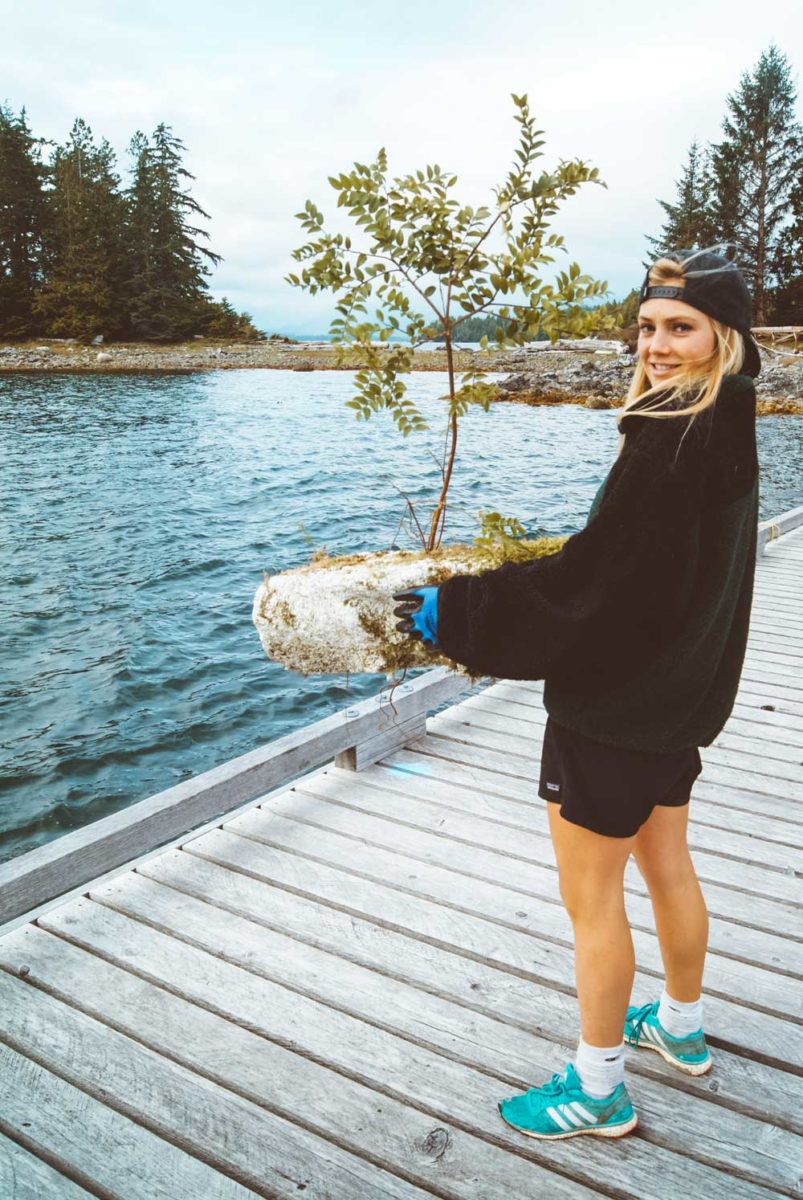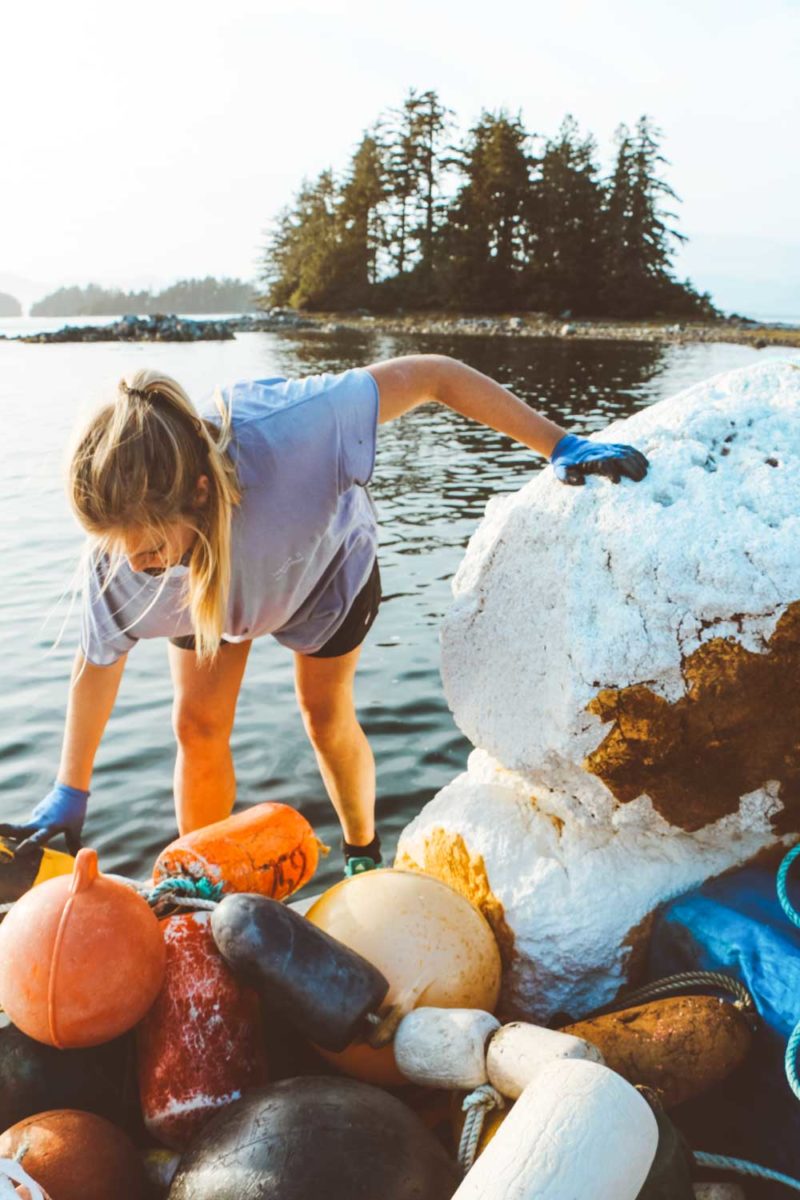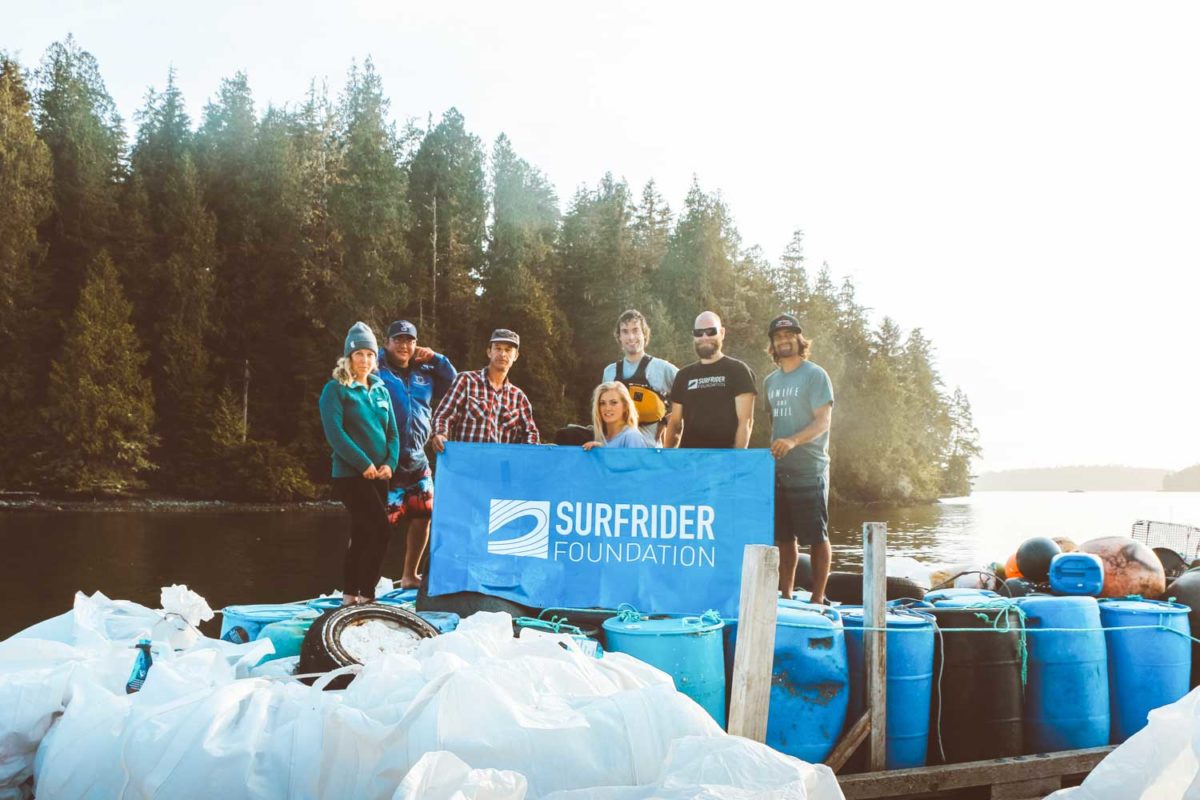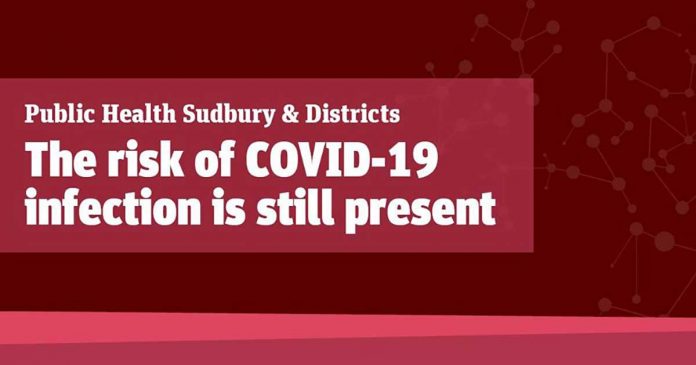MANITOULIN – Lilly Woodbury lives in Tofino now, on the west coast of Vancouver Island, but she was raised on Manitoulin Island. Ms. Woodbury works for a British Columbia chapter of a California-based organization called Surfrider Foundation, addressing plastic pollution, climate change, clean water, ocean protection and coastal preservation. There are many similarities between the two islands, she said, but she experienced some culture shock on a recent trip back to Manitoulin.
Many British Columbia municipalities have banned single use plastic products and shifted to a culture of refill and reuse, especially on Vancouver Island and the lower mainland, she explained. The shock was seeing plastics everywhere but a lack of recycling and producer responsibility programs (PRP) in Ontario. She was happy to hear of the current transition to PRP. “It was a good reminder to remember to say no and to be proactive when I go into the grocery store,” she said. “Even when you’re dining in there are plastic ramekins.”
Ms. Woodbury officially works for Surfrider’s Tofino chapter but there are three chapters in British Columbia and she does work for all three. Much of the focus is on plastic pollution: like Manitoulin, Vancouver Island and the lower mainland have economies that are very tourism dependent and see a proliferation of waste in the institutional, commercial and industrial sectors.
“Because of the way British Columbia is geographically positioned, with all of our islands and covers and bays and nooks, we have a lot of plastic washing up erroneously on our shorelines from all over the world but also from BC industries,” she said. The biggest source of marine debris comes from commercial fishing, aquaculture and open net salmon farming. “In BC you can go into any remote bay and you’re going to find literally tonnes of styrofoam, buoys, billets and other equipment along with consumer plastics.” She didn’t find much aquaculture or fishing gear on Manitoulin beaches, but fishing gear, lines and nets are commonly found in Lake Huron.
Surfrider is similar in ways to Manitoulin Streams Improvement Association. They work with youth and businesses and provide general public education through workshops and presentations. Much of what they do involves local and remote area clean-ups, using that data to inform their education programs and campaigns. “We are mostly campaign driven,” Ms. Woodbury said, “working to address the root of the issue.”
They successfully campaigned to have plastic straws and bags banned across the coast and are working to add polystyrene to the list. “We’re also looking to get rid of plastic cutlery and we’re soon launching a campaign to eliminate single use plastic water bottles under one litre.”

Before she joined Surfrider, initially as a volunteer and as staff for the past three-and-a-half years, she didn’t realize plastic pollution was such a big issue. “I knew waste and littering weren’t good but I didn’t have one class on plastic pollution during my entire degree,” she said.
Ms. Woodbury originally planned to attend the University of Toronto for a degree in philosophy and cinema studies. During a visit to Tofino she became immersed in the terrestrial and marine ecosystems, learning that humans had stood up and fought on behalf of the ecosystems and became a passionate advocate for the environment.
“Humans had stood up for ecosystems rights,” she said. “This was led by First Nations and supported by allies. We don’t just live in some pristine wilderness on Vancouver Island or on Manitoulin Island. It’s because people have been active co-creators in protecting and regenerating it. For a place that was so beautiful, having lived in multiple beautiful places but having this narrative be so much stronger here (in Tofino), it really inspired me and really reoriented my entire life.”
She quickly changed all her courses to environmental. That was nine years ago and she’s never looked back. She returned to Tofino in 2015 and became involved in multiple causes, including mining and logging but mostly fish farming, a big issue on the west coast.
At that time, the existing Surfrider chapter wasn’t very active on the west coast and Ms. Woodbury was frustrated. “I felt I had a lot to give,” she said. “I wanted to be a real leader in this movement. I knew that my capacity and my passion for this was massive but I didn’t feel like they were investing in me very much.”
Then came a new chapter with a new board with fresh energy; she joined as a volunteer just as the world was becoming aware of the plastic pollution crisis. It really hit the global stage in 2017 and 2018. One of their first actions was the ‘Straws Suck’ campaign where they eliminated plastic straws from use in Tofino and Ucluelet. The campaign went global. “I think Tofino was the first town in Canada to do this so we became the leader in Canada for plastic campaigning and ended up getting contacts and hits from around the world,” she noted. Following the straws campaign Ms. Woodbury worked for Greenpeace in New Zealand (yet another island) before Surfrider obtained funding and hired her for the Tofino chapter.
She believes a circular economy is key to manage plastics. A circular economy focuses on the elimination of waste by reusing or recycling products or components to reduce the extraction and use of raw materials. “I’m realizing how our mismanagement and our inefficient use of materials is not only contributing to pollution and wasted resources but the climate crisis as well,” she said, noting that 40 percent of global emissions come from our existing linear economic system “where we take, make and waste.”
We need to shift to circularity to not only overcome pollution and waste but also to stabilize the climate, regenerate natural systems and create jobs in the process, she said. “For instance, there’s a carbon sequestration plant in BC that can directly capture carbon from the air and use that as the base for building plastics. We can have a low carbon plastic economy by taking it out of sinks instead of sources in the ground.” These materials can then fulfill the needs of industries such as automotive and construction.
“When you look at the breakdown of plastics, products and packaging make up a significant portion. We can really work to address what we don’t need and work towards reuse, refill, bulk and recycled content as well as other materials that have a smaller footprint and impact.”
All stakeholders have a responsibility to contribute to this issue, she said; however, not all individuals can opt out of plastics; issues of social justice such as poverty and infrastructure need to be addressed. “Individuals aren’t in a place to turn down plastic water bottles if they don’t have clean water in their community,” she said. “Many First Nations still don’t have potable water. Also, if people don’t have a lot of money and they’ve been disconnected from their traditional food sources they’re going to rely on plastics because that’s the cheapest food option.”
It is up to individuals who are in a place of privilege to turn down what they don’t need, Ms. Woodbury said. On Manitoulin, she saw people who could say no to plastic straws and plastic bags but didn’t, even though these are things one doesn’t need. “We need change beyond individual actions, though. We need systemic change,” she said.
That belief is why Surfrider is working with commercial and industrial sectors: to help them shift their operations to keep materials in use and to use less plastic. They are working to help the fishing and aquaculture industries put into place policies and protocols that require less gear and to implement a recycling system for that gear once it reaches the end of its life.
It’s also why they’re lobbying to shift government regulations: once the regulations are in place the corporations are legally accountable. Many of the regulations they are advocating for would impact corporations and include expansion of producer responsibilities. “That needs to happen not only in BC but it needs to be mandated by the federal government,” she said. They’re hoping that will happen under the Canada-wide Strategy on Zero Plastic Waste announced in June 2019.

What individuals on Manitoulin can do to contribute to that systemic change, if they have the time and resources, is educate themselves or get involved with an environmental group. Teachers can talk about these issues within the schools (Surfrider has written a whole curriculum that they would be willing to share). “Islanders can do clean-ups, whether formal and established or informal,” Ms. Woodbury said. “When you go to a place, leave it better than when you found it. Pack out whatever you brought in. When you do that, you begin to create a culture that is steeped in environmental reciprocity. Everything we do all day long is dependent on the environment.”
She feels that Canadian culture is not especially founded in environmental respect and regeneration. We’re not disconnected, she said. “We are connected every minute of every hour of every day. A better word is dissociated. We are dissociated from the natural world. That’s a matter of perception: we see ourselves as separate.”
By changing the way we see ourselves and our connection with our natural environment, we can increase the quality of our own lives and live more meaningfully. This is also going to contribute to a necessary cultural shift, she said. This will be reflected in the regulations that govern our systems and our cultures. By going out and getting involved, we will see that we are not separate. “If you get involved and do clean-ups, you’re going to be a lot less likely to litter, a lot less likely to buy plastic and a lot more likely to engage in other types of environmental action.”
It’s an evolution with no end: we’re always learning, growing and discovering, she said. “That’s the kind of base that we need to create that larger systemic change. We need to be telling our local, provincial and federal governments that Canadians want this, that it’s a crisis and here is the evidence and here’s what we can do about it.”
Mutual encouragement and positive psychology are powerful ways of reaching more people and are far more productive than the negative emotions of fear, guilt or shame. “It’s shocking to see how often those tactics are still used by people on the ground, by organizations and by government in general communication strategies, and it’s been proven that that doesn’t work,” she noted. “We need to connect to the values of the people. People on Manitoulin are very family oriented. They love fishing, the outdoors and hunting. If we want our families to have happy lives, if we want our kids to have happy lives, we need to ensure there’s a healthy environment for them to flourish in the future. If we want to continue fishing and enjoying that beautiful Manitoulin culture we need to protect the Great Lakes and see that fish aren’t threatened by plastics, which they are right now.”

More than 22 million pounds of plastic end up in the Great Lakes each year which is a massive threat to fish and wildlife, she adds. They’re finding plastic in the fish. “We need to have these conversations to meet people where they’re at, to respect their values because no matter what it is: fishing, hunting, our families or our jobs, there’s always interconnection with the environment and the movement towards regeneration.”
We only need to look at other countries where they have cultures that respect the environment and see this is reflected in their regulations—countries like Rwanda, Norway, Finland or Sweden. She admits it is not a simple one-prong solution. “It is multiple solutions that need to be strategically woven together.”
For those of us who do have the time to give back or the ability, it helps us to become more aware and more conscious citizens. “There is a correlation to us having more meaningful, happier and more connected lives,” she said. “That is what we are here to do. When we shift the culture and pass those regulations, we’re also able to make it easier for other people to have access to the movement, to be able to engage in pro-environmental behaviours or purchases because now we’ve changed market conditions so now environmental products are cheaper for people. The spin-off effects and the ripples will lead us to a more equitable planet.”
There is hope within that narrative, and empowerment, Ms. Woodbury believes.





